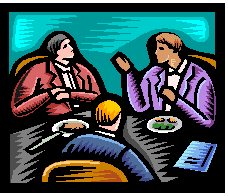 So they keep telling new writers. But if you don’t tell, how're the readers supposed to know? You’re telling a story, after all. So what do they mean, anyway? ‘Tell’ means summarizing what happened, without much regard to how the characters felt, whereas ‘Show’ means relating what happened, leaving the reader to fill in the blanks. Instead of saying George was a miser, show that he refused to donate to a charity, even though he had a ton of money locked away, allowing the reader to infer that George is a miser. Instead of saying Susan is beautiful, show that her sister is jealous of the way people stare at her in a restaurant. The reader will infer that Susan is attractive. Example of ‘Tell’: On her way home, Susan picked up groceries because her husband was such a slob. She met her long lost friend Ryan, on whom she had a crush in high school. He had a little kid now. And the reader says, “Hmm. So what? Does she still like him? Did he like her back? Did the meeting mean anything after all these years? Why should I care?” The same scene in the “Show” mode could be something like this: Exhausted from typing the brief, Susan wanted nothing more than to go home and crash. But she knew the kids would be hungry. She had seen little Mark pour out the last drops of the 1% milk into his cereal bowl, while Miriam had half a cup of orange juice. Susan would have to make a pit-stop. If only Peter would behave like a real father and help out once in a while…But it was a night of terrible judgment that made her marry the slob. Now she was stuck with him. She knew he must have watched TV all day, chomping on chips and salsa. It was up to her. As usual. She made a U-turn into Broadway and drove into the parking lot of A1-supermarket. Grabbing the cloth bags from the trunk, she rushed into the store. As the glass doors slip open, she almost bumped into someone. The man dropped his grocery bag, spilling its contents all over the entrance of the store. “Sorry!” She said, bending down to help him pick up the bread and a bag of diapers. “Susan?” he said, holding a can of baked beans. She looked up at his face. It was vaguely familiar. His faded blue eyes and dirty blond hair and those freckles on his nose. Oh My God! “Ryan?” Her heart was pounding. Her stomach was in knots and her mouth dry. How could it be that after fifteen years, he still made her feel that way? He grinned, his eyes crinkling up just as she remembered, when she knew every line and curve of his face. He grabbed her in a massive bear hug. “Where have you been?” She struggled out of his grasp. Diapers! He had bought diapers!  Alfred Hitchcock once said, “Movies are life with the boring parts cut out.” So it is with writing dialogue. A conversation between two people should be crisp, sizzling, gripping, and move the story forward. It should show emotion and conflict. Adding action and thoughts to the dialogue adds that extra zest. Let’s take the following example: An estranged father is meeting his now-teenage son after ten years. “Hello, son.” “Hello.” “You look good.” “Thanks.” “You have your mother’s eyes.” “So they say.” “Um…I’m back now, son. My drinking days are over.” “We don’t need you.” This sounds dry and boring. So let’s add some action and now. He came close to me. He looked old. “Hello, son.” “Hello.” I took a step back. He smiled. “You look good.” I rolled my eyes. "Thanks." “You have your mother’s eyes.” “So they say.” He tried to touch my shoulder. “Um…I’m back now, son. My drinking days are over.” “We don’t need you.” I turned around and walked away. Better, but it’s not engaging, because we don’t know if the son is being too harsh on his father, or why. We need to empathize with the boyNow let’s add the son’s emotions and some description: He came close to me. “Hello, son.” He looked older than I remembered. He had bags under his eyes and a receding hairline. I wondered if I’d become bald one day. I did have this SOB’s genes. "Hello." I would not call him Dad. I took a step back. Why was he here now? We were doing just fine without him. We didn’t need him, Mom and I. We had a good life now. She had a job, and I had school. He smiled. “You look good.” He was trying to ingratiate himself. He looked relieved that I said hello back to him. But it was not with any affection, or love. It was just good manners. Manners that he had never taught me. He had never been around for that long. I have learnt everything from Mom. “Thanks.” I rolled my eyes, trying to act cool. I didn’t need him. I don’t need him. “You have your mother’s eyes.” I clenched my jaw. “So they say.” That’s not what people say. Everyone says I have his eyes. Why was he lying? Had he already met Mom? Did she ask him to talk to me? I couldn’t let her get back with him. He was just going to hurt us again. He tried to touch my shoulder. “Um…I’m back now, son. My drinking days are over.” Once a drunk, always a drunk. I didn’t believe him. How could he think we’d take him back? What about all the hurt he had caused? Where was he when I was bullied in school? When the cops came to the house, searching for dope which I didn’t have? Mom and I needed him once. But not anymore. I’m almost a grown-up. I can take care of her. “We don’t need you,” I said, tears pricking my eyes. Then I turned around and walked away. Now we have the beginning of a story... |
Want to learn how to write fiction? Check out these helpful books.
Archives
September 2022
Categories |


 RSS Feed
RSS Feed